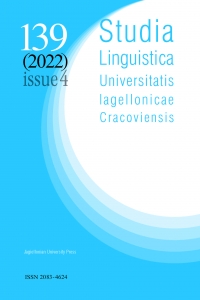The Difference Between the Optative and the “Modal” Indicative in Homeric Greek: Four Case Studies – Part 2: The Indicative and the εἰ Μή-Clauses
The Difference Between the Optative and the “Modal” Indicative in Homeric Greek: Four Case Studies – Part 2: The Indicative and the εἰ Μή-Clauses
Author(s): Filip De DeckerSubject(s): Historical Linguistics
Published by: Wydawnictwo Uniwersytetu Jagiellońskiego
Keywords: mood and modality; optative; indicative; irrealis; Homeric Greek;
Summary/Abstract: In epic Greek both the optative and the indicative (the so-called “modal indicative”) can be used in contexts where the degree of realization is uncertain or even impossible, while in Attic Greek only the indicative is used. In these two articles I discuss whether there is a difference between the optative and the modal indicative in these contexts and/or if it can be determined which was the original mood. As there are about 1500 optatives and 250 modal indicatives in Homer, it is not possible to discuss them all and, therefore, I focus on the passages in which aorist forms of γιγνώσκω, βάλλωand of ἴδονappear, and those conditional constructions in the Odyssey in which the postposed conditional clause is introduced by εἰμήwith either a “modal” indicative or optative. The corpus comprises 100 forms (80 optatives and 20 indicatives), but in each example I also address the other modal indicatives and optatives in the passages, which adds another 50 forms to the corpus. In this part (part 2) I address the modal indicatives, and discuss the postposed conditional clauses introduced by εἰμήin the Odyssey, both in the indicative and the optative. Subsequently I analyze several instances in which the interpretation depends on the viewpoint of the hearer and the speakers, as what is possible for a speaker might be impossible for the hearer and vice versa. When comparing the data relating to the optative and the indicative, and especially that of the postposed conditional clauses introduced by εἰμή, it can be noted that the indicative has more frequently an exclusively past reference and that it is more often genuinely unreal than the optative, which often combines the notion of the possible, remotely possible and unreal. In my opinion this clearly indicates that the indicative eventually prevailed and replaced the optative because of the past reference.
Journal: Studia Linguistica Universitatis Iagellonicae Cracoviensis
- Issue Year: 139/2022
- Issue No: 4
- Page Range: 301-328
- Page Count: 28
- Language: English

